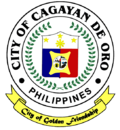This article needs additional citations for verification .(January 2021) |
| Mayor of Cagayan de Oro | |
|---|---|
 Seal of Cagayan de Oro | |
since June 30, 2022 | |
| Style | The Honorable (Formal) |
| Appointer | Elected via popular vote |
| Term length | 3 years, not eligible for re-election immediately after three consecutive terms |
| Inaugural holder | Toribio Chaves |
| Formation | 1898 |

The mayor of Cagayan de Oro (Filipino : Punong lungsod ng Cagayan de Oro) is the head of the local government of the city who elected to three year terms. The Mayor is also the executive head and leads the city's departments in executing the city ordinances and improving public services. The city mayor is restricted to three consecutive terms, totaling nine years, although a mayor can be elected again after an interruption of one term.
































